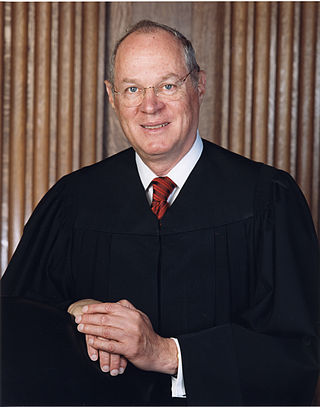
The Supreme Court of the United States (SCOTUS) is the highest court in the federal judiciary of the United States. It has ultimate appellate jurisdiction over all U.S. federal court cases, and over state court cases that turn on questions of U.S. constitutional or federal law. It also has original jurisdiction over a narrow range of cases, specifically "all Cases affecting Ambassadors, other public Ministers and Consuls, and those in which a State shall be Party." The court holds the power of judicial review: the ability to invalidate a statute for violating a provision of the Constitution. It is also able to strike down presidential directives for violating either the Constitution or statutory law.

Sandra Day O'Connor was an American attorney, politician, and jurist who served as an associate justice of the Supreme Court of the United States from 1981 to 2006. Nominated by President Ronald Reagan, O'Connor was the first woman to serve as a U.S. Supreme Court justice. A moderate conservative, she was considered a swing vote. Before O'Connor's tenure on the Court, she was an Arizona state judge and earlier an elected legislator in Arizona, serving as the first female majority leader of a state senate as the Republican leader in the Arizona Senate. Upon her nomination to the Court, O'Connor was confirmed unanimously by the United States Senate.
This page serves as an index of lists of United States Supreme Court cases. The United States Supreme Court is the highest federal court of the United States.

Samuel Anthony Alito Jr. is an American jurist who serves as an associate justice of the Supreme Court of the United States. He was nominated to the high court by President George W. Bush on October 31, 2005, and has served on it since January 31, 2006. After Antonin Scalia, Alito is the second Italian American justice to serve on the U.S. Supreme Court.

The Supreme Court of Florida is the highest court in the U.S. state of Florida. It consists of seven justices—one of whom serves as Chief Justice. Six members are chosen from six districts around the state to foster geographic diversity, and one is selected at large.

John Glover Roberts Jr. is an American jurist who has served as the 17th chief justice of the United States since 2005. He has been described as having a moderate conservative judicial philosophy, though he is primarily an institutionalist. For his willingness to work with the Supreme Court's liberal bloc, Roberts has been regarded as a swing vote on the U.S. Supreme Court.

The 2005 term of the Supreme Court of the United States began October 3, 2005, and concluded October 1, 2006. The table illustrates which opinion was filed by each justice in each case and which justices joined each opinion.

The 2004 term of the Supreme Court of the United States began October 4, 2004, and concluded October 3, 2005. The table illustrates which opinion was filed by each justice in each case and which justices joined each opinion.

The 2003 term of the Supreme Court of the United States began October 6, 2003, and concluded October 3, 2004. The table illustrates which opinion was filed by each justice in each case and which justices joined each opinion.

Anthony McLeod Kennedy is an American attorney and jurist who served as an associate justice of the Supreme Court of the United States from 1988 until his retirement in 2018. He was nominated to the court in 1987 by President Ronald Reagan, and sworn in on February 18, 1988. After the retirement of Sandra Day O'Connor in 2006, he was considered the swing vote on many of the Roberts Court's 5–4 decisions.

Robert Trimble was a lawyer and jurist who served as Justice of the Kentucky Court of Appeals, as United States district judge of the United States District Court for the District of Kentucky and as Associate Justice of the Supreme Court of the United States from 1826 to his death in 1828. During his brief Supreme Court tenure he authored several majority opinions, including the decision in Ogden v. Saunders, which was the only majority opinion that Chief Justice John Marshall ever dissented from during his 34 years on the Court.







